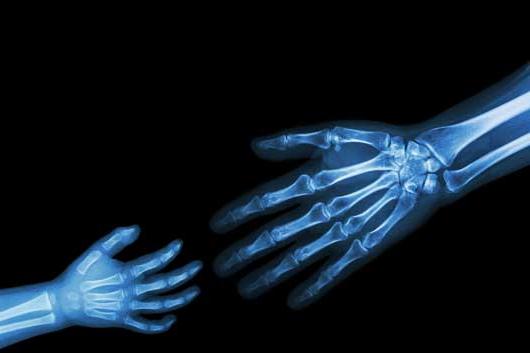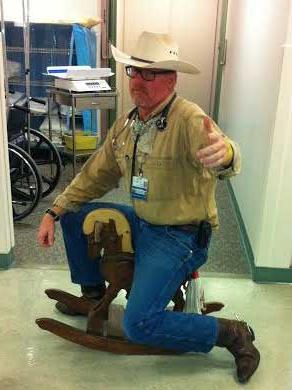 Mike Nelson, a CU-Boulder alumnus with degrees in Spanish and history, 当他清楚地看到儿童特别需要良好的医疗照顾时,他找到了自己的使命. Outside his practice, 纳尔逊志愿担任蒂华纳儿童医院的翻译和儿科医生.
Mike Nelson, a CU-Boulder alumnus with degrees in Spanish and history, 当他清楚地看到儿童特别需要良好的医疗照顾时,他找到了自己的使命. Outside his practice, 纳尔逊志愿担任蒂华纳儿童医院的翻译和儿科医生.
校友认为是加州大学博尔德分校的历史教授让他进了医学院
By Lara Herrington Watson
博彩平台推荐校友,儿科医生迈克·纳尔逊(91届 & 西班牙语)每天使用他的学位,并归功于一位热情的教授帮助他进入医学院.
Nelson is general pediatrician at Kaiser Permanente, 他还是凯撒认证的医疗西班牙语翻译. 纳尔逊流利的西班牙语常常让他的病人感到惊讶,因为他的外表. 正如纳尔逊所描述的那样,他“不是伊斯帕尼奥拉岛的写照”.”
他在美国练习,距离墨西哥提华纳五英里. 他的病人中有近三分之二主要讲西班牙语.
 Mike Nelson
Mike Nelson
纳尔逊说,当他第一次见到病人和他们的家人时,“他们进来时看到的是一个白人. 我能感觉到父母在用英语交流他们生病的孩子时的紧张."
When Nelson introduces himself with a kind, “Yo soy el doctor Nelson. En que le puedo ayudar hoy?” he sees their faces relax. “我很荣幸能够弥合这种差距,帮助父母把注意力集中在孩子身上. It’s difficult to describe how satisfying that is.”
Nelson honed much of his skill set at CU-Boulder, a natural fit given his family ties to the school, 他的姐姐温迪和母亲桑迪也参加了.
“博彩平台推荐一直是高等教育的顶峰,是一个有趣而友好的地方 do something academically,” Nelson says.
在那里,纳尔逊追随他的激情,西班牙语和历史,这又把他引向了医学.
和美洲之友在拉丁美洲旅行过, 一个将志愿者与社区健康项目联系起来的项目, 纳尔逊很快了解到他有医学背景可以做些什么.
He also learned how vital communication is to medicine.
“我还记得我最初在拉丁美洲生病的几次……以及我对用第二语言有效地(传达)我的症状和担忧的恐惧。,” Nelson says.
Today, he is on the other side of the hospital bed.
They come in and see a Caucasian guy. 我能感觉到父母在用英语交流他们生病的孩子时的紧张.”
After speaking Spanish in Latin America for three summers, he spent a year abroad in Seville, Spain, where he achieved fluency by, among other things, reading Spanish newspapers aloud in his room at night.
他在博尔德东部的一家小诊所做志愿者,学会了一口流利的西班牙语.
“我真的很喜欢这种让自己完全融入(西班牙)文化的想法,” Nelson says.
Outside his practice, 纳尔逊志愿担任蒂华纳儿童医院的翻译和儿科医生,帮助世界知名的遗传学家. Ken and Marilyn Jones run a specialty genetics clinic.
尼尔森也是圣地亚哥凯撒唇腭裂和颅面诊所的医学主任, 一个全国公认的跨学科团队,协调这些患者有时复杂的护理. With an incidence of one in 600 to 1,200 births, 唇裂和腭裂是极为常见的先天缺陷.
当新生儿被发现有唇裂或腭裂时, Nelson breaks the news to their parents.
尼尔森说:“帮助婴儿的一部分是帮助家庭接受先天缺陷。. “对父母来说,这是一段非常艰难和激动人心的经历.”
“我对我在凯撒医疗集团帮助培养的这支分裂团队充满信心, 我试着向父母们传达这种信心,让他们放心,一切都会好起来的……我很自豪能成为其中的一员.”
To better help the families emotionally and medically, specifically with special bottles and feeding techniques, Nelson uses his Spanish and history skills.
正是在加州大学博尔德分校,纳尔逊爱上了历史,并学会了像历史学家一样思考.
纳尔逊说:“我的梦想是热情地追求历史,并让它活起来。. He often spent six or eight hours in the library, 尽可能地阅读有关某个历史人物或事件的一切资料.
He remembers that Fred Anderson, his American history professor at CU-Boulder, 有这样的激情,“你会走进他的讲座,就像去看电影一样?. 他是一个令人难以置信的讲故事的人,他可以制作完全陌生的东西, like the economics of the French and Indian War, make complete and utter sense.”
安德森要求他的学生综合这些信息,并在考试中写45分钟的文章. 纳尔逊学会了把复杂的信息简化.
纳尔逊参加医学院入学MCAT考试的那一年,其中包括一篇加权论文. The prompt: Why do societies need to know about their histories?
“This was a perfect golfball, teed right up on my platter,” says Nelson, 用一篇博彩app推荐美国革命的文章回答了这个问题. “I did okay in sciences. I think [the essay] slanted the rest of my test.”
Two decades later, 他曾就读于乔治华盛顿大学,并在关岛和圣地亚哥的海军服役, 纳尔逊仍然在使用他从安德森那里学到的技巧:“我是一名医生, but I’m also a historian. I take a [medical] history 25 times a day.”
每天,他都会收集病人的生理、解剖和精神状况的信息. 他还从患者所在的社区、文化和社会经济地位的角度来看待每位患者.
尼尔森的最终目标不仅仅是制作一份深入的病史, but also to more completely comprehend the whole patient, 改善病人的整体健康,帮助他们茁壮成长.
他还必须为他的同事综合这些信息, something he says is often difficult for physicians.
Ultimately, Nelson says, “你必须能够就医疗记录进行交流, 能够讲一个故事,用简洁的语言解释你在做什么, precise and easy-to-read format. 像历史学家一样思考能让我成为更好的医生.”
Lara Herrington Watson是CU的校友(11年)和自由撰稿人,她在丹佛和凤凰城之间工作.
April 27, 2016
